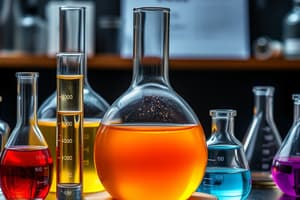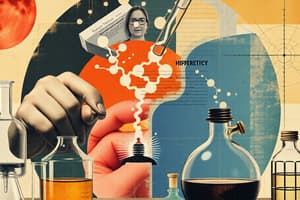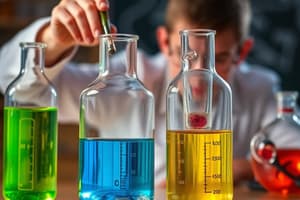Podcast
Questions and Answers
What is the role of a control in an experiment?
What is the role of a control in an experiment?
- To introduce multiple variables for comparison
- To eliminate the need for repetition in testing
- To serve as a benchmark for the test group (correct)
- To bias the results in favor of the hypothesis
Which of the following best describes a variable in an experiment?
Which of the following best describes a variable in an experiment?
- Factors that remain unchanged throughout the experiment
- The single element that is manipulated to test its effects (correct)
- A comparison group that is not exposed to the variable
- The final result that is analyzed after experimentation
What does double-blind testing aim to minimize?
What does double-blind testing aim to minimize?
- Bias in the outcomes of an experiment (correct)
- The risk of ethical violations
- The influence of external variables
- The number of participants in the study
What happens when a hypothesis does not match the experimental results?
What happens when a hypothesis does not match the experimental results?
What distinguishes a theory from a principle in scientific terms?
What distinguishes a theory from a principle in scientific terms?
What is meant by the term 'replicate' in scientific experimentation?
What is meant by the term 'replicate' in scientific experimentation?
Which journal is most likely to publish results of scientific experiments?
Which journal is most likely to publish results of scientific experiments?
Accidental discoveries and misinterpretations of results represent limitations of what?
Accidental discoveries and misinterpretations of results represent limitations of what?
Flashcards are hidden until you start studying
Study Notes
Hypothesis and Experimentation
- A hypothesis is an educated guess based on observations that predicts an outcome.
- An experiment tests the hypothesis through repeatable methods to assess its validity.
Control and Variables
- A control serves as a baseline for comparison against the test group in an experiment.
- Variables are the changing elements within an experiment; ideally, only one variable should be altered to maintain reliability.
Results and Theory
- If the results do not align with the hypothesis, the hypothesis may be revised, or the experiment redesigned.
- Scientific journals are the preferred platforms for scientists to publish results for peer evaluation.
- A replicate involves repeating an experiment to ensure statistical reliability of the findings.
Understanding Theory and Principle
- A theory is a well-tested explanation that validates a hypothesis repeatedly through evidence.
- A principle is a theory that has been established and verified as accurate over a significant timeframe.
Double-Blind Testing
- Double-blind testing ensures neither the tester nor the participant knows which group (placebo or test) they belong to, minimizing bias.
- The primary aim of double-blind testing is to enhance the integrity of experimental results by reducing bias.
Good Experimentation Practices
- Effective experiments should employ a large sample size for more accurate results and include a control group for reliability.
Limitations in Scientific Knowledge
- Limitations include accidental discoveries that can lead to unforeseen implications, and misinterpretations of data that may skew results.
Studying That Suits You
Use AI to generate personalized quizzes and flashcards to suit your learning preferences.




